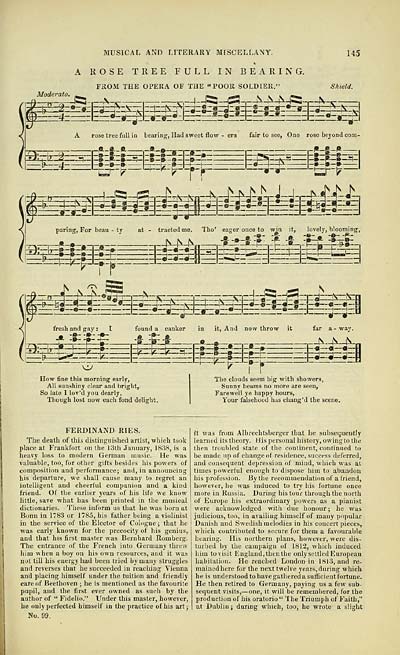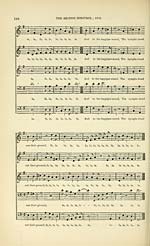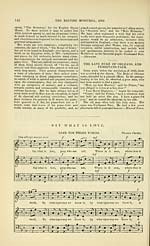Glen Collection of printed music > Printed music > British minstrel, and musical and literary miscellany
(837) Page 145 - Rose tree full in bearing
Download files
Complete book:
Individual page:
Thumbnail gallery: Grid view | List view

MUSICAL AxN'D LITERARY MISCELLANY.
A ROSE TREE FULL IN BEARING.
FKOM THE OPERA OF THE "POOR SOLDIER."
Moderato. ,^ ._-^ __- i v w ,n>.
145
Shield.
A rose treo full in bearing, Had sweet flow - ers fair to see, One rose beyond com-
I — ,""K ■= F»—B— »■—=;-
:&:-
53
:i=i=«zt:
SE*ElEIE|ElE
paring. For beau - ty
— r— ft-«
at - tractedme.
Tho' eager once to win it.
lovely, blooming,
_C=^Z[^_
--^'-x^
-l-z^-t:
:Ji:
.,_-|__j^_.
,^ \
SIe^eIeeieie;
:i.-B=:^:l==
=:S==fc:^
fresh and gay :
found a canker
,3.?^
:fc
it, And now throw it
?_E*E^E5E E^e|eSe|eE^:
far a - wa;
IIe^e^I
\y
How fine this morning early.
All sunshiny clear and bright,
So late I lov'd you dearly,
Though lost now each fond delight.
The clouds seem big with showers,
Sunny beams no more are seen,
Farewell ye happy hours,
Your falsehood h;is chang'd the scene.
FERDINAND RIES.
The death of this distinguished artist, which took
place at Frankfort on the 13tli January, 1838, is a
heavy loss to modern German music. He was
valuable, too, for other gifts besides his powers of
composition and performance; and, in announcing
his departure, we shall cause many to regret an
intelligent and cheerlul companion and a kind
friend. Of the earlier years of his life we know
little, save what has been printed in tlie musical
dictionaries. These inform us tliat he was born at
Bonn in 1783 or 1785, his father being a violinist
in the service of the Elector of Cologne; that he
was early known for the precocity of his genius,
and that his first master was Bernhard Romberg.
The entrance of the French into Germany threw
him when a boy on his own resources, and it was
not till his energy had been tried by many struggles
and reverses that he succeeded in reaching Vienna
and placing himself under the tuiti(m and friendly
care of Beethoven ; he is mentioned as the favourite
pupil, and the first ever owned as such by the
author of " Fidelio." Under this master, however,
he only perfected himself in the practice ofhis art;
No. 99.
it was from Albrechtsberger that he subsequently
learned its theory. His personal history, owing to the
then troubled state of the continent, continued to
be made up of change of residence, success deferred,
and consequent depression of mind, which was at
times powerful enough to dispose him to abandon
his profession. By the recommendation of a friend,
however, he was induced to try liis fortune once
more in Russia. During his tour through the north
of Europe his extraordinary powers as a pianist
were acknowledged with due honour; he was
judicious, too, in availing himself of many popular
Danish and Swedish melodies in his concert pieces,
which contrib^ited to secure for tliem a favourable
hearing. His northern plans, however, were dis-
turbed by the campaign of I8I2, which induced
him to visit England, then the only settled European
habitation. He reached Loudon in 1813, and re-
mainedhere for the next twelve years, during which
he is understood tohavegatheredasufiicientfortune.
He then retired to Germany, paying us a few sub-
sequent visits, — one, it will be remembered, for the
production ofhis oratorio" The Triumph of Faith,"
at Dublin ; during which, too, he wrote a slight
A ROSE TREE FULL IN BEARING.
FKOM THE OPERA OF THE "POOR SOLDIER."
Moderato. ,^ ._-^ __- i v w ,n>.
145
Shield.
A rose treo full in bearing, Had sweet flow - ers fair to see, One rose beyond com-
I — ,""K ■= F»—B— »■—=;-
:&:-
53
:i=i=«zt:
SE*ElEIE|ElE
paring. For beau - ty
— r— ft-«
at - tractedme.
Tho' eager once to win it.
lovely, blooming,
_C=^Z[^_
--^'-x^
-l-z^-t:
:Ji:
.,_-|__j^_.
,^ \
SIe^eIeeieie;
:i.-B=:^:l==
=:S==fc:^
fresh and gay :
found a canker
,3.?^
:fc
it, And now throw it
?_E*E^E5E E^e|eSe|eE^:
far a - wa;
IIe^e^I
\y
How fine this morning early.
All sunshiny clear and bright,
So late I lov'd you dearly,
Though lost now each fond delight.
The clouds seem big with showers,
Sunny beams no more are seen,
Farewell ye happy hours,
Your falsehood h;is chang'd the scene.
FERDINAND RIES.
The death of this distinguished artist, which took
place at Frankfort on the 13tli January, 1838, is a
heavy loss to modern German music. He was
valuable, too, for other gifts besides his powers of
composition and performance; and, in announcing
his departure, we shall cause many to regret an
intelligent and cheerlul companion and a kind
friend. Of the earlier years of his life we know
little, save what has been printed in tlie musical
dictionaries. These inform us tliat he was born at
Bonn in 1783 or 1785, his father being a violinist
in the service of the Elector of Cologne; that he
was early known for the precocity of his genius,
and that his first master was Bernhard Romberg.
The entrance of the French into Germany threw
him when a boy on his own resources, and it was
not till his energy had been tried by many struggles
and reverses that he succeeded in reaching Vienna
and placing himself under the tuiti(m and friendly
care of Beethoven ; he is mentioned as the favourite
pupil, and the first ever owned as such by the
author of " Fidelio." Under this master, however,
he only perfected himself in the practice ofhis art;
No. 99.
it was from Albrechtsberger that he subsequently
learned its theory. His personal history, owing to the
then troubled state of the continent, continued to
be made up of change of residence, success deferred,
and consequent depression of mind, which was at
times powerful enough to dispose him to abandon
his profession. By the recommendation of a friend,
however, he was induced to try liis fortune once
more in Russia. During his tour through the north
of Europe his extraordinary powers as a pianist
were acknowledged with due honour; he was
judicious, too, in availing himself of many popular
Danish and Swedish melodies in his concert pieces,
which contrib^ited to secure for tliem a favourable
hearing. His northern plans, however, were dis-
turbed by the campaign of I8I2, which induced
him to visit England, then the only settled European
habitation. He reached Loudon in 1813, and re-
mainedhere for the next twelve years, during which
he is understood tohavegatheredasufiicientfortune.
He then retired to Germany, paying us a few sub-
sequent visits, — one, it will be remembered, for the
production ofhis oratorio" The Triumph of Faith,"
at Dublin ; during which, too, he wrote a slight
Set display mode to: Large image | Transcription
Images and transcriptions on this page, including medium image downloads, may be used under the Creative Commons Attribution 4.0 International Licence unless otherwise stated. ![]()
| Special collections of printed music > Glen Collection of printed music > Printed music > British minstrel, and musical and literary miscellany > (837) Page 145 - Rose tree full in bearing |
|---|
| Permanent URL | https://digital.nls.uk/91444989 |
|---|
| Description | Scottish songs and music of the 18th and early 19th centuries, including music for the Highland bagpipe. These are selected items from the collection of John Glen (1833 to 1904). Also includes a few manuscripts, some treatises, and other books on the subject. |
|---|
| Description | The Glen Collection and the Inglis Collection represent mainly 18th and 19th century Scottish music, including Scottish songs. The collections of Berlioz and Verdi collected by bibliographer Cecil Hopkinson contain contemporary and later editions of the works of the two composers Berlioz and Verdi. |
|---|

